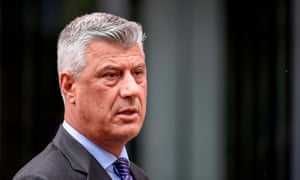
Court examining crimes during 1998-99 war also charges nine other former separatist fighters
Shaun Walker and Julian Borger
Wed 24 Jun 2020 The Guardian
A prosecutor investigating crimes committed during Kosovo‘s 1998-99 independence war with Serbia has indicted Kosovo’s president, Hashim Thaçi, for crimes against humanity and war crimes.
The indictment was announced as Thaçi was on his way to Washington for a White House meeting with Serbia’s president organised by Richard Grenell, Donald Trump’s controversial ambassador to Germany who was also appointed as the administration’s Balkan peace envoy.
The meeting had been scheduled for Saturday, but Grenell announced on Twitter on Wednesday evening that Thaçi had cancelled his visit following the announcement. “I respect his decision not to attend the discussions until the legal issues of those allegations are settled,” Grenell wrote. Kosovo’s new prime minister, Avdullah Hoti, will represent the country at the White House meeting.
Trump is hoping to gain a diplomatic victory by brokering a deal between the two countries, which have not normalised relations since Kosovo broke away from Serbia following a Nato bombing campaign in 1999. Kosovo declared independence in 2008 but this is not recognised by Serbia. Nor is Kosovo a member of the UN or other major international bodies.
The surprise announcement on Wednesday by the prosecutor’s office at the Kosovo specialist chambers in the Hague appeared designed to scupper chances for a White House deal that could make Thaçi politically untouchable.
The prosecutor’s statement said Thaçi and nine other former commanders in the Kosovo Liberation Army, which fought a guerrilla campaign against Serb forces before the Nato intervention, had been indicted in April.
The indictment is for a range of crimes against humanity and war crimes, including murder, enforced disappearance, persecution and torture. It says the group is criminally responsible for nearly 100 murders, and notes that the victims were Serbs, Kosovo Albanians and other ethnicities, and included political opponents.
Wednesday’s statement makes it clear that the pre-trial judge had not yet confirmed the charges, but the prosecutor’s office said it was taking the unusual step of making the charges public before that point because of Thaçi’s repeated efforts to “obstruct and undermine” the court’s work.
“I assume the prosecutor got permission from the court to do this,” said Clint Williamson, a former US special envoy on war crimes who led the Kosovo investigation which formed the basis for the charges.
“When I released the preliminary investigative findings back in 2014, I cited concerns about witness intimidation and other efforts to obstruct the investigation, and there is every indication that this has continued,” he said. “The release of the public announcement of the indictment seems to reflect the ongoing concerns about that.”
The Kosovo specialist chambers were established in 2015 through an amendment to the Kosovo constitution and the passing of a special law to establish its jurisdiction. It came after the EU special investigation that Williamson led found “compelling” evidence of systemic war crimes carried out by the KLA leadership.
Thaçi did not immediately comment on the indictment, but a spokesman confirmed that he had been on his way to Washington at the time it was made public. In an interview with the Guardian in 2018, Thaçi said: “We believe the special court was unnecessary and unfair, but because of our relationship with the EU and the US we decided to support it.”
The prosecutor’s statement accuses Thaçi and Kadri Veseli, the former speaker of Kosovo’s parliament, of carrying out a secret campaign to overturn the law setting up the court in an attempt to obstruct its work and evade trial. “By taking these actions, Mr Thaçi and Mr Veseli have put their personal interests ahead of the victims of their crimes, the rule of law, and all people of Kosovo,” it said.
There has been uneasiness in the international community at the length of time the specialist chambers has taken to produce indictments, and concern that Thaçi could be more amenable to signing a deal with Serbia brokered by Trump in order to lessen the chance of being summoned by the court.
“I think Thaçi is hoping he can deliver something to the administration so they will give him some kind of pass on the prosecution,” a former US diplomat who was based in the region said before the news that the talks had been cancelled. “But I just don’t know how that would work.”
The US secretary of state, Mike Pompeo, wrote a formal letter to Thaçi in March supporting the work of the Kosovo court and telling him not to try to obstruct its work.
“The abolishment or undermining the work, structure or locations of Kosovo specialist chambers and specialist prosecutor’s office in any way would seriously infringe Kosovo’s credibility in the world,” Pompeo said, according to a leaked copy of the letter. “Any such claim would leave a permanent spot on Kosovo, its commitment to the rule of law would be under question, justice for victims would be denied and Kosovo’s future would be blurred.”
The former diplomat said that even if the Trump administration were to give Thaçi license to ignore the indictment, that stance would be likely to be reversed if Joe Biden were to win the US presidential election in November. When Biden was vice-president he wrote a letter to Thaçi telling him the US required him to cooperate with the Kosovo chambers.
Both Grenell and the EU had been pushing talks between Thaçi and the Serbian president, Aleksandar Vučić, but they are now likely to be stalled indefinitely.
No comments:
Post a Comment